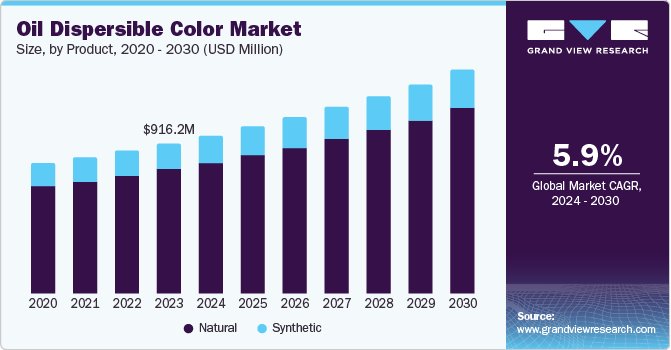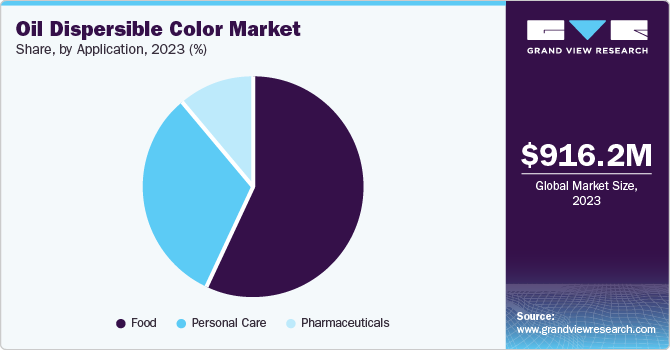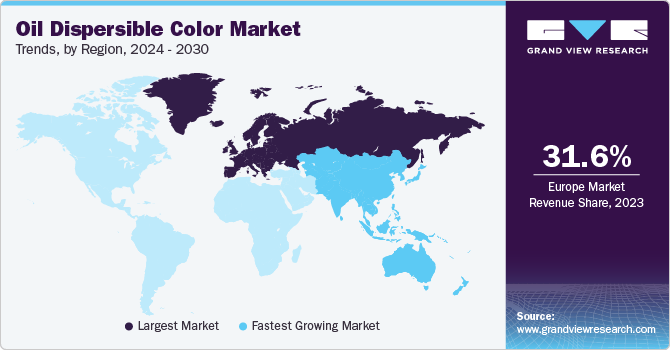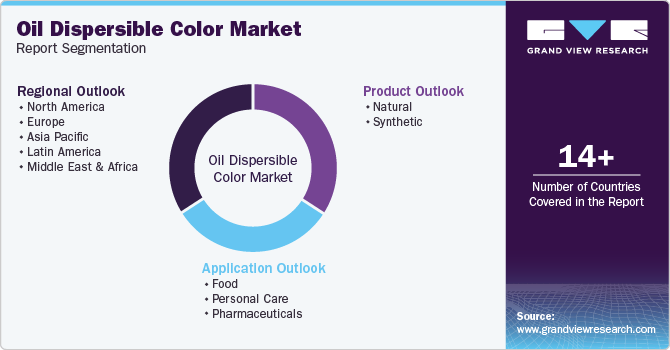
Oil Dispersible Color Market Size, Share & Trends Analysis Report By Product (Natural, Synthetic), By Application (Food & Beverages, Cosmetics, Pharmaceuticals), By Region, And Segment Forecasts, 2024 - 2030
- Report ID: GVR-3-68038-451-2
- Number of Report Pages: 80
- Format: PDF, Horizon Databook
- Historical Range: 2018 - 2022
- Forecast Period: 2024 - 2030
- Industry: Consumer Goods
Oil Dispersible Color Market Size & Trends
The global oil dispersible color market size was valued at USD 916.2 million in 2023 and is anticipated to grow at a CAGR of 5.9% from 2024 to 2030. This growth can be attributed to the rising demand for natural and organic products in the food and beverage industry. The cosmetics and personal care industry is also experiencing a surge in demand for natural colorants as consumers seek safer and more sustainable options. Technological advancements in extraction and formulation processes have improved the quality and stability of oil dispersible colors, making them more appealing to manufacturers.

Governments and regulatory bodies worldwide increasingly advocate using natural ingredients in food, cosmetics, and pharmaceuticals. This push is largely due to growing consumer awareness about the potential health risks associated with synthetic additives. The European Union has stringent regulations that favor natural food colors over synthetic ones. This regulatory environment encourages manufacturers to adopt oil dispersible natural colors free from genetically modified organisms (GMOs) and allergens. In addition, the rise of clean-label products and the expanding application of oil dispersible colors in new sectors, such as pharmaceuticals and nutraceuticals, are anticipated to drive future market expansion. These trends collectively indicate a promising outlook for the oil dispersible color market.
Product Insights
The natural segment accounted for 82.6% of the market revenue in 2023 owing to the growing consumer preference for natural and organic products, driven by increasing health consciousness and awareness of the potential adverse effects of synthetic additives. Natural oil-dispersible colors are favored for their safety, eco-friendliness, and compliance with stringent regulatory standards. In particular, the food and beverage industry has seen a surge in demand for these natural colorants as consumers seek clean-label products with transparent ingredient lists.
The synthetic segment is expected to grow at a CAGR of 5.6% from 2024 to 2030. Despite the increasing preference for natural colorants, synthetic oil dispersible colors remain in demand due to their vibrant hues, cost-effectiveness, and superior stability. These colors are extensively used in applications requiring intense and consistent coloring, such as in confectionery, processed foods, and certain cosmetic products. The synthetic segment growth is also driven by ongoing innovations aimed at improving the safety and environmental impact of synthetic colorants.
Application Insights
The food segment held the largest revenue share in the global oil dispersible color market in 2023 primarily driven by the increasing demand for natural and vibrant colorants in the food and beverage industry. The growing trend of plant-based and organic foods has further propelled the demand for natural oil dispersible colors. The food industry’s stringent regulatory standards regarding food safety and the use of additives also support the preference for natural colorants, contributing to the substantial market share of the segment.

The personal care segment is expected to grow at the fastest rate over the forecast period. As consumers become more aware of the potential health risks associated with synthetic chemicals, there is a rising demand for products that are free from harmful additives and are environmentally friendly. The personal care industry’s focus on innovation and the development of new formulations that cater to the growing demand for clean and green beauty products is also driving the segment growth.
Regional Insights
North America accounted for a significant share of the global oil dispersible color market revenue in 2023 driven by the high demand for natural and synthetic colorants in the food and beverage industry, as well as the cosmetics sector. The region’s strong regulatory framework, which emphasizes the use of safe and sustainable ingredients, further supports market growth. For instance, the FDA’s regulations on color additives ensure that products meet stringent safety standards, boosting consumer confidence and demand.
U.S. Oil Dispersible Color Market Trends
The U.S. held a significant revenue share in the North America oil dispersible color market in 2023. The country’s robust food and beverage industry, coupled with a growing preference for natural and organic products, drives the demand for oil dispersible colors. In addition, the cosmetics and personal care sectors are increasingly adopting these colorants to meet consumer demand for clean-label and eco-friendly products. Innovations in color formulation and extraction technologies also contribute to the market’s growth in the U.S.
Asia Pacific Oil Dispersible Color Market Trends
The Asia Pacific oil dispersible color market is projected to experience the fastest growth at a CAGR of 6.6% over the forecast period attributed to the booming food and beverage and cosmetics industries in countries such as India, Japan, and China. The rising middle-class population, increasing disposable incomes, and growing awareness of the benefits of natural colorants are key factors driving market expansion. In addition, the region’s manufacturers are increasingly focusing on sustainable and eco-friendly products to cater to evolving consumer preferences.
Europe Oil Dispersible Color Market Trends
The European oil dispersible color market dominated the global market with a revenue share of 31.6% in 2023. The region’s stringent regulations on food safety and cosmetic ingredients, such as the European Union’s REACH regulation, promote the use of natural and safe colorants. The demand for clean-label products and the growing trend of organic and natural cosmetics are significant drivers of market growth. Countries such as Germany, France, and the UK are leading the adoption of oil-dispersible colors in various applications, including personal care, food, and beverage products.

MEA Oil Dispersible Color Market Trends
The Middle East and Africa (MEA) region is projected to grow at a significant CAGR over the forecast period. The increasing demand for processed foods and beverages, along with the rising popularity of natural and organic cosmetics, drives the market in this region. Countries such as South Africa and the UAE are witnessing significant growth in the food and personal care sectors, which boosts the demand for oil dispersible colors. In addition, the region’s manufacturers are adopting advanced technologies to improve the quality and stability of these colorants, further supporting market growth.
Key Oil Dispersible Color Company Insights
The global oil dispersible color market is driven by major companies such as Sensient Technologies Corporation, DDW The Color House, Chr. Hansen Holding A/S, Roha Dyechem Pvt. Ltd, and GNT Group, among others.
-
Sensient Technologies Corporation offers extensive range of natural and synthetic color solutions. The company uses advanced technologies to produce high-quality, stable, and vibrant oil dispersible colors that cater to various industries, including food & beverages, cosmetics, and pharmaceuticals..
-
Chr. Hansen Holding A/S offers its expertise in natural color solutions. The company’s oil dispersible colors are widely used in the food and beverage industry, where there is a growing demand for clean-label and natural ingredients.
Key Oil Dispersible Color Companies:
The following are the leading companies in the oil dispersible color market. These companies collectively hold the largest market share and dictate industry trends.
- Sensient Technologies Corporation
- DDW The Color House
- DDW The Color House
- Roha Dyechem Pvt. Ltd
- GNT Group
- Lycored
- Naturex (a Givaudan company)
- AromataGroup
- Kalsec Inc
- Fiorio Colori S.p.A.
Recent Developments
-
In September 2024, Givaudan Active Beauty introduced the [N.A.S.] Vibrant Collection, a novel range of 100% natural origin active botanical extracts for hybrid makeup. This collection incorporates oil-dispersible powders engineered to provide biological efficacy in makeup without sacrificing color performance, intensity, or stability.
-
In March 2024, Benjamin Moore, a provider of paint, color, and coatings, launched Woodluxe a comprehensive line of premium, all-weather exterior stains. These products are available in both water and oil-based formulas with varying opacities.
Oil Dispersible Color Market Scope
|
Report Attribute |
Details |
|
Market size value in 2024 |
USD 964.4 million |
|
Revenue forecast in 2030 |
USD 1.36 billion |
|
Growth rate |
CAGR of 5.9% from 2024 to 2030 |
|
Base year for estimation |
2023 |
|
Historical data |
2018 - 2022 |
|
Forecast period |
2024 - 2030 |
|
Quantitative units |
Revenue in USD million/billion, and CAGR from 2024 to 2030 |
|
Report coverage |
Revenue forecast, company ranking, competitive landscape, growth factors, and trends |
|
Segments covered |
Product, application, region |
|
Regional scope |
North America, Europe, Asia Pacific, Latin America, MEA |
|
Country scope |
U.S., Canada, Mexico, Germany, UK, France, Italy, Spain, China, India, Japan, South Korea, Australia, Brazil, South Africa |
|
Key companies profiled |
Sensient Technologies Corporation, DDW The Color House, Chr. Hansen Holding A/S, Roha Dyechem Pvt. Ltd, GNT Group, Lycored, Naturex, AromataGroup, Kalsec Inc, Fiorio Colori S.p.A. |
|
Customization scope |
Free report customization (equivalent up to 8 analysts’ working days) with purchase. Addition or alteration to country, regional & segment scope. |
|
Pricing and purchase options |
Avail customized purchase options to meet your exact research needs. Explore purchase options |
Global Oil Dispersible Color Market Report Segmentation
This report forecasts revenue & volume growth of the oil dispersible color market and provides an analysis of the latest industry trends in each of the sub-segments from 2018 to 2030. For this study, Grand View Research has segmented the global oil dispersible color market report based on product, application, and region:

-
Product Outlook (Revenue, USD Million, 2018 - 2030)
-
Natural
-
Synthetic
-
-
Application Outlook (Revenue, USD Million, 2018 - 2030)
-
Food
-
Personal Care
-
Pharmaceuticals
-
-
Regional Outlook (Revenue, USD Million, 2018 - 2030)
-
North America
-
U.S.
-
Canada
-
Mexico
-
-
Europe
-
UK
-
Germany
-
France
-
Italy
-
Spain
-
-
Asia Pacific
-
Japan
-
China
-
India
-
-
Latin America
-
Brazil
-
-
Middle East & Africa
-
South Africa
-
-
We are committed towards customer satisfaction, and quality service.
"The quality of research they have done for us has been excellent."




